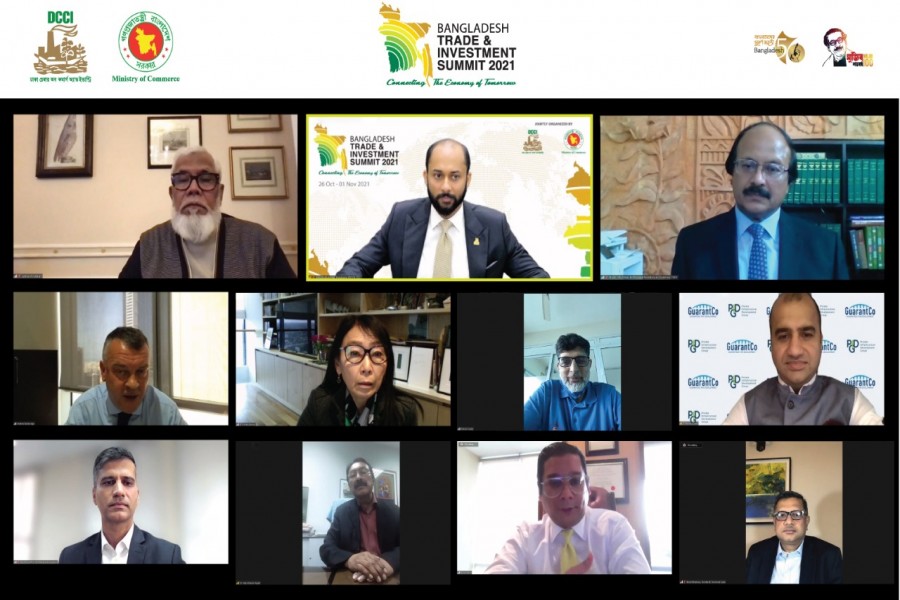Bangladesh can no longer bank only on budgetary money or banking capital for financing long-term projects, especially the ones of development of infrastructure, an investment conference concluded on Sunday.
The participants called for making a vibrant bond market to help take the country’s infrastructure development to the next level after a massive public sector financing for implementing mega-projects in recent times.
At the webinar on the 6th day of ‘Bangladesh Trade and Investment Summit 2021’, businessmen, investors and present and former officials observed that Bangladesh would need multiple windows for funding development projects with the participation of the private players.
Salman Fazlur Rahman, Private Industry and Investment Adviser to the Prime Minister, observed that the financing market does not function “as a perfect market” because Taka is not fully convertible under a controlled exchange rate regime.
“I don’t think we will get Take convertible very soon, (but) ultimately we will have to (make it convertible), if we want to become a middle income country,” he told the webinar on ‘Bridging the infrastructure financing gap through credit solutions in Bangladesh’, jointly organised by the Ministry of Commerce and Dhaka Chamber of Commerce and Industry (DCCI).
Mr Salman Rahman pointed out ‘fundamental distortion’ in the country’s banking system while financing long-term projects. “We are using short-term deposits for long-term projects,” he said addressing as chief guest.
The business-leader-turned-politician mentioned that the central bank has a difference of opinion with securities’ regulator over the banks’ exposure to the capital market, which, he added, involves equity market, not a bond market.
Mr Salman Rahman expressed his conviction that a properly traded bond market can address the banking sectors defects and also remove differences between the Bangladesh Bank and Bangladesh Securities and Exchange Commission.
DCCI President Rizwan Rahman, in his opening remarks, said the country’s infrastructure development is heavily dependent on the public sector financing, which hovers around 4.0 per cent of GDP, compared to 5010 per cent rates maintained by the neighbouring economies.
“Participation of the private investment is essential to accelerate infrastructural development,” he said.
Special Guest Md. Nojibur Rahman, a former principal secretary to the prime minister and Chairman of Capital Market Stabilisation Fund, observed that there is an infrastructure development boom in Bangladesh. “We need capital and we need long-term finance. Domestic financing is not enough for that,” he added.
He also mentioned that partnership with foreign entities such as Guarantco is now ‘making life easy'.
“Political will of the government for the private sector is very positive,” he said.
GuarantCo, which finances projects in low-income counties, has funded a project styled Technaf Solartech in Bangladesh worth US$13.5 million for generating 20-megawatt electricity with a dual currency financing solution, said its Asia Managing Director Nishant Kumar. He added that they have also provided a 100 per cent bond guarantee of US$25 million (Tk 2.1 billion) guarantee for a 7-year onshore bond to Pran Agro Ltd.
Yukiko Omura, Chair of GuarantCo, said GuarantCo, a solution provider under PIDG, is in Bangladesh to assist to develop the local capital market and provide credit solutions to finance infrastructure projects that help boost economic growth.
“We work across the project life cycle through deploying grants, equity, long term debt and guaranty even in local currency,” said Andrew Bainbridge, Chair of PIDG.
Managing Director at Standard Chartered Bangladesh Muhit Rahman explained that large infrastructure projects need financing of 12-15 years. “There are ample opportunities for Bangladesh to avail foreign currency solutions,” he said adding, “We need to focus on attracting commercial loans and bond investments.”
Dr Abul Kalam Azad, Executive Director, Bangladesh Bank, Ala Ahmad, Chief Executive Officer, MetLife Bangladesh, Ahsan Khan Chowdhury, Chairman & CEO, PRAN-RFL Group, and Nuher Latif Khan, Managing Director, Technaf Solartech, also spoke on the occasion.


